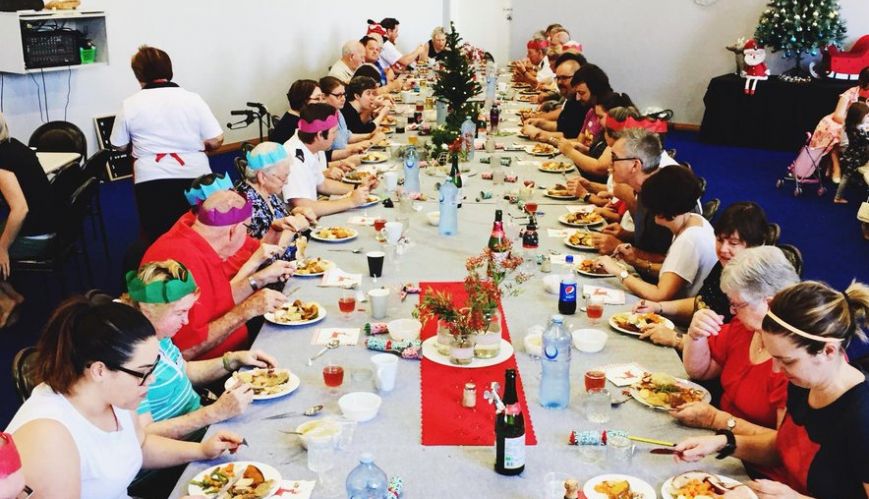An inclusive Christmas

An inclusive Christmas
5 December 2017
Shellharbour Salvos Christmas party - sharing life, sharing food, sharing Jesus.
Anyone who knows me, knows that I love Christmas.
I have several Pinterest boards dedicated to Christmas baking, craft and decorations. And I love listening to Christmas carols. Over the years, however, Christmas has also become a profoundly spiritual time for me.
Every year, as I participate in Christmas preparation, I am reminded that a vulnerable, helpless and displaced baby was God’s plan of redemption and reconciliation for the entire world. As I reflect upon the Christmas story I am struck by the ways in which the Kingdom of God is revealed through the different people involved.
In Luke 2:10, we read of angels announcing the birth of Christ to the Shepherds. Yet, this Lord is not powerful or rich. He is an outsider, a baby completely dependent on others, born to a people who are occupied and oppressed. And still, he is the saviour of the world. God’s plan of redemption for the world doesn’t start with someone who can command an audience. It starts with a baby.
This reveals to us the values of the Kingdom of God. God chooses to use people who are excluded, marginalised, weak and vulnerable, and considered “other” by society. Mary was pregnant out of wedlock. Against all cultural and social expectations Joseph decided to stay engaged to Mary. They would have remained on the margins for the rest of their lives.
The shepherds were working class and considered unclean by Jewish culture, yet they are the people the birth of Jesus is revealed to. The magi who came from the east are foreigners concerned with science and astrology. For the Jewish people who studied and interpreted Scripture, not the stars, the inclusion of the magi is unusual and almost offensive. Yet, God still uses these foreigners in the Christmas story.
The Christmas story is extraordinarily counter-cultural to the narrative of Christmas embraced by Australians. The first Christmas was about the inclusion of outsiders, and yet today we typically celebrate Christmas with those closest to us.
Australian society loves mateship, but we rarely extend friendship to those who are left on the outside – people seeking asylum and refuge, those living in poverty, people who are homeless, the immigrant, our nation’s First Peoples, people experiencing family and domestic violence.
If the first Christmas story was one of hope and inclusion for all people, what is the Christmas message for people who are marginalised now?
Australians love celebrating Christmas with food, family and friends, sport, music and, if you’re from my family, afternoon naps. Of course these celebrations aren’t bad, but as I reflect on the Christmas story, I wonder if there is a different way to embrace Christmas? Last year, Australians spent around $8.8 billion on Christmas presents alone.
Yet people who present to The Salvation Army for assistance receive just $17.14 of income support per day. Is the Christmas story an opportunity to assess how we spend our money and time?
Christmas should be about the inclusion of those who are on the edges of our communities, or excluded altogether. There are things we can do to ensure the inclusion and dignity of people during Christmas (for example, using the Ethical Shopping Guide, or upcycling gifts).
But ultimately, the Christmas story is a counter-cultural one that invites us to change the way we live, not just the way we celebrate. Some practical responses could include:
• Gather people from your faith community and go for a prayer walk in your church neighbourhood. Ask God to reveal people who are the “excluded”.
• Consider researching where your Christmas presents were made. Check out the Ethical Fashion Guide.
• Volunteer at your community support service during Christmas. Take time to talk to those who are coming for assistance, and listen to their stories. Check out locally run Christmas events, consider attending or volunteering, or combine your church’s events with them!
• There are many “Christmas orphans” who are alone at Christmas. Consider hosting a guest this festive season.
Who are the outsiders in your community? And how might God be asking you to include them this festive season? More importantly, how may God be asking you to include people throughout the year? The birth of Christ is a clear statement that the Kingdom of God is about a new way of living. In the midst of baking, presents, holidays and fundraising, have we forgotten about the inclusive message of Christmas?
It is easy to get swept up in the festivities, so take a moment and ask not what does Christmas means to me, but what does Christmas mean to those in my community?
Amanda Merrett is Assistant to the Social Justice Secretary in The Salvation Army Australia Southern Territory.
Comments
No comments yet - be the first.